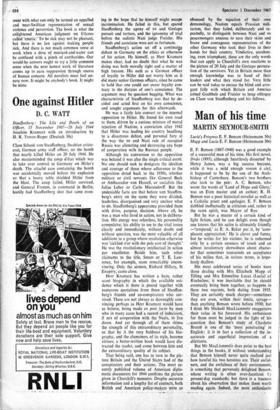Stauffenberg : The Life and Death of an Officer, 15
November 1907-20 July 1944 Joachim Kramarz with an introduction by H.• R. Trevor-Roper (Deutsch 30s)
One against Hitler
D. C. WATT
Claus Schenk von Stauffenberg, Swabian aristo- crat, German army staff officer, set the bomb that nearly killed Hitler on 20 July 1944. He also masterminded the coup d'etat which was to take over control in Germany on Hitler's death. The attaché case containing the bomb was accidentally moved before the explosion so that a heavy table shielded Hitler from the blast. The coup failed, Hitler survived, and General Fromm, in command in Berlin, hastily had Stauffenberg shot that same even- ing in the hope that he himself might escape incrimination. He failed in this, but spared Stauffenberg the agony of ss and Gestapo pursuit and torture, and the ignominy of trial before the sadistic Nazi judge Freisler. His friends and associates were not so fortunate.
Stauffenberg's action set off a continuing debate in- Germany on the ethics or otherwise of his action. He himself, as Herr Kramarz makes clear, had no doubt that what he was doing was both morally right and a matter of high treason. His oath as a German officer of loyalty to Hitler did not worry him as it did many senior German officers, since he came to hold that one could not swear loyalty con- trary to the dictates of one's conscience. The argument may be question begging. What was characteristic of Stauffenberg was that be de- cided and acted first on his own conscience, and sought arguments for this afterwards.
He was a fairly late convert to the internal opposition to Hitler. He found his own road to them, driven by a curious mixture of moral rejection of Nazism, a conviction after 1942 that Hitler was leading his country headlong to a disastrous defeat, and personal fury at the way the ss and Nazi rule of occupied Russia was alienating and destroying any hope of cooperation with the Russian people.
Although his conversion to the opposition was belated it was also the single critical event. No one should seek to denigrate the idealism and courage of those whose adherence to the opposition dated back to the 1930s, whether military -or civil servants like General Beck or Ambassador von Hassell, or socialists like Julius Leber or Carlo Mierendorff. But the undeniable facts are that before von Stauffen- berg's entry on the scene they were divided, leaderless, disorganised and very unclear what to do. Stauffenberg's appearance provided them with drive, purpose, decision. Above all, he was a man who lived in action, not in delibera- tion. His energy was relentless, his personality compulsive; his ability to see to the vital issues clearly and immediately, without doubt and without question, was the most valuable of all additions to a group where resolution otherwise was `sicklied o'er with the pale cast of thought.' He was the revolutionary intellectual in action par excellence. Beside him, such other claimants to the title, Smuts or T. E. Law- rence, for example, seem remarkably uncon- vincing. Only the airmen, Richard Hillary, St Exupery, came close.
Herr Kramarz has written a bare, rather scant biography in which the available evi- dence which is there is pieced together with numerous quotations from those of Stauffen- berg's friends and co-conspirators who sur- vived. These are not always as thoroughly con- vincing perhaps as Herr Kramarz would have us believe, being made ex post facto by men who in many cases had a record of indecision, if not of cooperation with the Nazis, to live down. And yet through all of them shines the strength of this extraordinary personality, so that by it the very baldness of his bio- graphy, and the clumsiness of its style, become virtues; a better-written book would have dis- tracted the reader, and come between him and the extraordinary quality of its subject.
That being said, one has to turn to the pic- ture Britain and the United States had of the conspirators and their actions. The most re- cently published volume of American diplo- matic documents for 1944 confirms the picture given in Churchill's memoirs. Despite accurate information and a lengthy list of contacts, both British and American policy-makers were so Obsessed by the equation of their own demonology, Nazism equals Prussian mili- tarism, that they failed, deliberately and re- peatedly, to distinguish between Nazi and ss peacemongers anxious to save their skins and brave and courageous representatives of the other Germany who took their lives in their hands for their country. Vindictive, unrelent- ing, even triumphant, these are the only words that can apply to Churchill's own reactions to the picture of 20 July and the Gestapo persecu- tion of the survivors. Yet in Britain more than enough knowledge was to hand of their leaders and what they stood for. Very little can be said today to excuse the blind and arro- gant folly with which Britain and America joined Goebbels and Freisler to heap obloquy on Claus von Stauffenberg and his fellows.


































 Previous page
Previous page